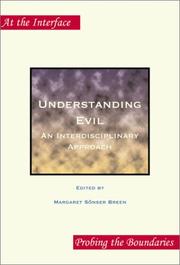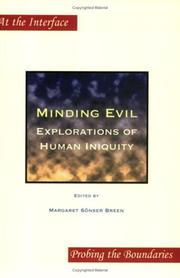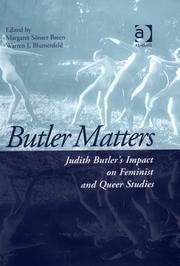| Listing 1 - 5 of 5 |
Sort by
|

ISBN: 1417564253 9781417564255 9401200947 9042009357 Year: 2003 Publisher: Amsterdam New York Rodopi
Abstract | Keywords | Export | Availability | Bookmark
 Loading...
Loading...Choose an application
- Reference Manager
- EndNote
- RefWorks (Direct export to RefWorks)
Written across the disciplines of law, literature, philosophy, and theology, Understanding Evil: An Interdisciplinary Approach represents wide-ranging approaches to and understandings of "evil" and "wickedness." Consisting of three sections - " Grappling with Evil ", " Justice, Responsibility, and War " and " Blame, Murder, and Retributivism " -, all the essays are inter-disciplinary and multi-disciplinary in focus. Common themes emerge around the dominant narrative movements of grieving, loss, powerlessness, and retribution that have shaped so many political and cultural issues around the world since the fall of 2001. At the same time, the interdisciplinary nature of this collection, together with the divergent views of its chapters, reminds one that, in the end, an inquiry into "evil" and "wickedness" is at its best when it promotes intelligence and compassion, creativity and cooperation. The thirteen essays are originally presented at and then developed in light of dialogues held at the Third Global Conference on Perspectives on Evil and Human Wickedness, held in March 2002 in Prague.
Collection of essays. --- Good and evil. --- Evil --- Wickedness --- Ethics --- Philosophy --- Polarity --- Religious thought

ISBN: 9401201501 1423787560 9781423787563 9042016787 9789042016781 9789401201506 Year: 2005 Publisher: Amsterdam New York Rodopi
Abstract | Keywords | Export | Availability | Bookmark
 Loading...
Loading...Choose an application
- Reference Manager
- EndNote
- RefWorks (Direct export to RefWorks)
Minding Evil: Explorations of Human Iniquity brings together fifteen essays, versions of which were presented at the Fifth International Conference on Evil and Wickedness, held in Prague in 2004. The volume examines evil and wickedness from a variety of disciplines, including criminology, cultural studies, gender studies, law, literature, peace studies, philosophy, psychology, and sociology. In so doing Minding Evil keeps in play the doubled meaning of its title: on the one hand, to tend to evil, that is, to oversee, cultivate, and deploy it; on the other hand, to be bothered by evil and so, in learning to identify or recognise it, to try to understand its workings and thus contain or control it and, perhaps, repair or undo it. While the essays taken together work to show the difficulty and at times the travesty of not being able to distinguish between the two meanings, it is this second meaning that remains key. What are the individual and collective responsibilities entailed in minding - being troubled by - evil? This is the central question of this volume.
Good and evil. --- Ethics. --- Deontology --- Ethics, Primitive --- Ethology --- Moral philosophy --- Morality --- Morals --- Philosophy, Moral --- Science, Moral --- Philosophy --- Values --- Evil --- Wickedness --- Ethics --- Polarity --- Religious thought
Book
ISBN: 1619254042 9781619254039 9781619254046 1619254034 Year: 2014 Publisher: Ipswich, Massachusetts Amenia, NY
Abstract | Keywords | Export | Availability | Bookmark
 Loading...
Loading...Choose an application
- Reference Manager
- EndNote
- RefWorks (Direct export to RefWorks)
So much of great literature centers on explorations of gender, sex, and sexuality. What does it mean to be a proper man or woman; what if one cannot be properly called either? Should one wield one's sexual power politically? What is the relation between law, divine or secular, and sexuality? What does it mean to fail at doing gender? These are just some of the questions that this volume, edited by Margaret Breen, Professor of English and Women's, Gender, and Sexuality Studies at University of Connecticut, examines. Essays will consider a range of texts, including Aristophanes' Lysistrata, Murasaki Shikibu's Tale of Genji, John Milton's Paradise Lost, Tennessee Williams' Cat on a Hot Tin Roof, and Sharon Dennis Wyeth's Tomboy Trouble in light of issues of gender, sex, and sexuality, and their interplay.

ISBN: 0754638855 1351953990 1138378852 1315261081 1351953982 9780754638858 9781351953993 9781315261089 Year: 2016 Publisher: Abingdon, Oxon
Abstract | Keywords | Export | Availability | Bookmark
 Loading...
Loading...Choose an application
- Reference Manager
- EndNote
- RefWorks (Direct export to RefWorks)
Feminist theory --- Sex role --- Gender identity --- Language and sex --- Butler, Judith, --- Gender identity. --- Sex role. --- Butler, Judith. --- Feminist theory. --- Language and sex. --- Sex and language --- Sex --- Sex identity (Gender identity) --- Sexual identity (Gender identity) --- Identity (Psychology) --- Sex (Psychology) --- Queer theory --- Gender role --- Sex differences (Psychology) --- Social role --- Gender expression --- Sexism --- Feminism --- Feminist philosophy --- Feminist sociology --- Theory of feminism --- Philosophy --- Butler, Judith, - 1956 --- -Gender identity. --- -Feminist theory. --- Gender roles --- Gendered role --- Gendered roles --- Role, Gender --- Role, Gendered --- Role, Sex --- Roles, Gender --- Roles, Gendered --- Roles, Sex --- Sex roles --- Gender dysphoria

ISBN: 9042011386 9401201005 1417564288 9781417564286 Year: 2004 Publisher: Amsterdam Rodopi
Abstract | Keywords | Export | Availability | Bookmark
 Loading...
Loading...Choose an application
- Reference Manager
- EndNote
- RefWorks (Direct export to RefWorks)
Written across the disciplines of art history, literature, philosophy, sociology, and theology, the ten essays comprising the collection all insist on multidimensional definitions of evil. Taking its title from a moment in Shakespeare's Tempest when Prospero acknowledges his responsibility for Caliban, this collection explores the necessarily ambivalent relationship between humanity and evil. To what extent are a given society's definitions of evil self-serving? Which figures are marginalized in the process of identifying evil? How is humanity itself implicated in the production of evil? Is evil itself something fundamentally human? These questions, indicative of the kinds of issues raised in this collection, seem all the more pressing in light of recent world events. The ten essays were originally presented at the First Global Conference on Perspectives on Evil and Human Wickedness, held in March 2000 in Lady Margaret Hall, Oxford University.
Good and evil. --- Evil --- Wickedness --- Ethics --- Philosophy --- Polarity --- Religious thought
| Listing 1 - 5 of 5 |
Sort by
|

 Search
Search Feedback
Feedback About UniCat
About UniCat  Help
Help News
News